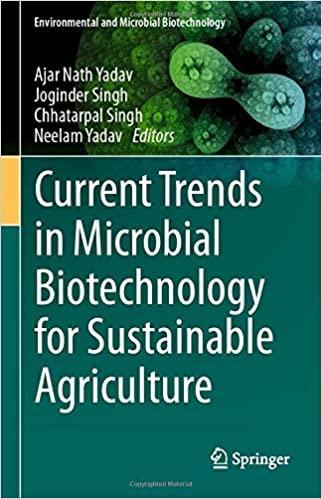Current Trends in Microbial Biotechnology for Sustainable Agriculture (Environmental and Microbial Biotechnology) 1st ed. 2021 Edition
32 $
Delivery time: Maximum to 1 hours
Current Trends in Microbial Biotechnology for Sustainable Agriculture (Environmental and Microbial Biotechnology) 1st ed. 2021 Edition
Microbial biotechnology is an emerging field with applications in a broad range of sectors involving food security, human nutrition, plant protection and overall basic research in the agricultural sciences. The environment has been sustaining the burden of mankind from time immemorial, and our indiscriminate use of its resources has led to the degradation of the climate, loss of soil fertility, and the need for sustainable strategies.
The major focus in the coming decades will be on achieving a green and clean environment by utilizing soil and plant-associated beneficial microbial communities. Plant-microbe interactions include the association of microbes with plant systems: epiphytic, endophytic and rhizospheric. The microbes associated with plant ecosystems play an important role in plant growth, development, and soil health. Moreover, soil and plant microbiomes help to promote plant growth, either directly or indirectly by means of plant growth-promoting mechanisms, e.g. the release of plant growth regulators; solubilization of phosphorus, potassium and zinc; biological nitrogen fixation; or by producing siderophores, ammonia, HCN and other secondary metabolites.
These beneficial microbial communities represent a novel and promising solution for agro-environmental sustainability by providing biofertilizers, bioprotectants, and biostimulants, in addition to mitigating various types of abiotic stress in plants. This book focuses on plant-microbe interactions; the biodiversity of soil and plant microbiomes; and their role in plant growth and soil health. Accordingly, it will be immensely useful to readers working in the biological sciences, especially microbiologists, biochemists and microbial biotechnologists.
Product Details
Product Details
- Publisher : Springer; 1st ed. 2021 edition (November 11, 2020)
- Language : English
- Digital eBook : 592 pages
Related Products
Basic Medical Book
Electrocardiography of Channelopathies: A Primer for the Clinical Cardiologist (PDF)
Basic Medical Book
Creative Thinking And Arts-Based Learning: Preschool Through Fourth Grade, 7th Edition (PDF)
Basic Medical Book
Basic Medical Book
Basic Medical Book
Basic Medical Book
Secrets Of Successful Program Design: A How-To Guide For Busy Fitness Professionals (PDF)
Basic Medical Book
Basic Medical Book
Basic Medical Book
Strength Zone Training: The Most Effective Method For Maximizing Muscle Development (PDF)
Basic Medical Book
Basic Medical Book
Basic Medical Book
Basic Medical Book
Velocity-Based Training: How To Apply Science, Technology, And Data To Maximize Performance (PDF)
Basic Medical Book
All-Pro Performance Training: An Insider’s Guide To Preparing For The Football Combine (PDF)
Basic Medical Book
The Language Of Coaching: The Art & Science Of Teaching Movement (PDF)
Basic Medical Book
Basic Medical Book
2023 & 2024 NIRSA Flag & Touch Football Rules Book & Officials’ Manual, 21st Edition (PDF)
Basic Medical Book
Achieving Excellence: Mastering Mindset For Peak Performance In Sport And Life (PDF)
Basic Medical Book
Neurodegenerative Diseases: Translational Models, Mechanisms, And Therapeutics (PDF)
Basic Medical Book
Breathe, Focus, Excel: Exercises, Techniques, And Strategies For Optimal Athletic Performance (PDF)
Basic Medical Book
Developing Speed (EPUB)- NSCA – National Strength & Conditioning Association, 2nd Edition
Basic Medical Book
Developing Speed – NSCA -National Strength & Conditioning Association, 2nd Edition (PDF)
Basic Medical Book
Personal Best Running: Coach Coogan’s Strategies For The Mile To The Marathon (PDF)
Basic Medical Book
Run Healthy: The Runner’s Guide To Injury Prevention And Treatment (PDF)
Basic Medical Book
Smarter Recovery: A Practical Guide To Maximizing Training Results (PDF)
Basic Medical Book
Basic Medical Book
Adapted Aquatics Programming: A Professional Guide, 2nd Edition (PDF)
Basic Medical Book
Genetics Primer For Exercise Science And Health (Primers In Exercise Science) (EPUB)
Basic Medical Book
Aquatech: Best Practices For Pool And Aquatic Facility Operators (PDF)
Basic Medical Book
Becoming A Sustainable Runner: A Guide To Running For Life, Community, And Planet (PDF)
Basic Medical Book
Breathe, Focus, Excel: Exercises, Techniques, And Strategies For Optimal Athletic Performance (EPUB)
Basic Medical Book
Basic Medical Book
Active Games For Children On The Autism Spectrum: Physical Literacy For Life (PDF)







































































































